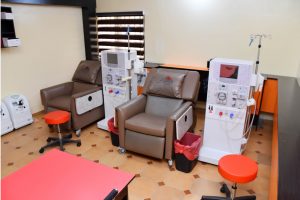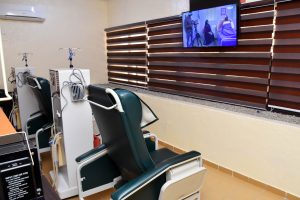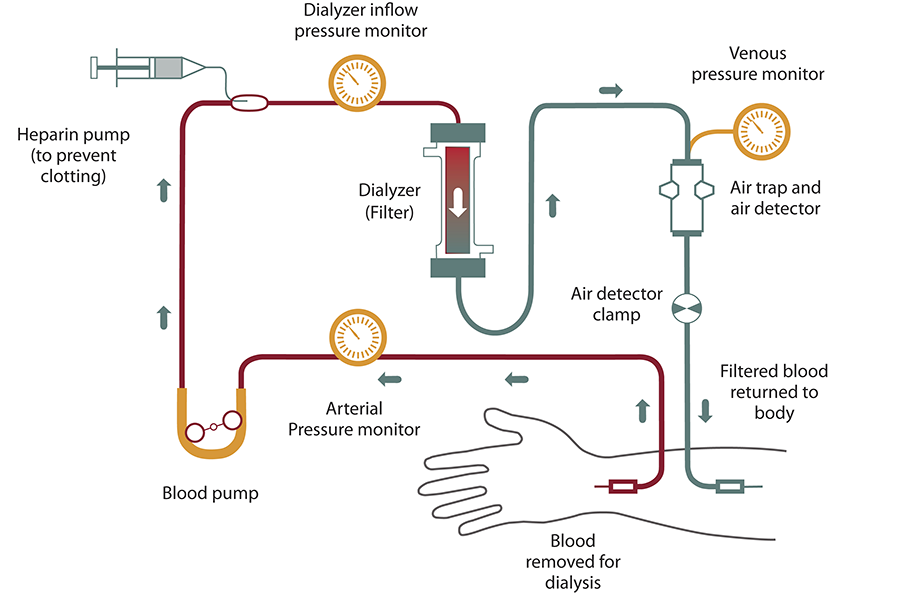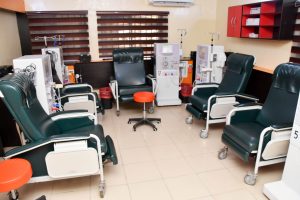Dialysis & VIP Dialysis Services
 Medicom Renal and Dialysis Centre provides convenient dialysis therapy for patients with kidney (renal) failure, also called end-stage renal disease. A dedicated team of leading dialysis experts provides comprehensive and compassionate dialysis care.
Medicom Renal and Dialysis Centre provides convenient dialysis therapy for patients with kidney (renal) failure, also called end-stage renal disease. A dedicated team of leading dialysis experts provides comprehensive and compassionate dialysis care.
We are located at the heart of FCT with 25 dialysis machines and special machines dedicated to immunocompromised patients to offer high standard of care within a relaxed and friendly atmosphere. We are designed, equipped and staffed to provide ultimate dialysis experience to kidney disease patients and build them up for Renal Transplant. We are committed to helping people with Chronic Kidney Disease (CKD) and End Stage Renal Disease (ESRD) live fuller, more active and vibrant lives.
Why Dialysis
 The purpose of dialysis is to clean your blood when your kidneys are unable to do their job due to end-stage renal disease or kidney failure.
The purpose of dialysis is to clean your blood when your kidneys are unable to do their job due to end-stage renal disease or kidney failure.
When your kidneys fail to function properly, waste products that are normally cleared by the kidneys build up in your bloodstream. As the levels of these toxins rise, you may begin to feel sluggish and nauseated. If left untreated, kidney failure can result in seizures, coma, and premature death. Dialysis removes these waste products when kidneys can no longer do so.
Who needs dialysis?
When a person with chronic kidney disease (CKD) reaches end stage renal disease (ESRD), also known as kidney failure or stage 5 kidney disease, the kidneys are no longer functioning to filter and clean the blood the way healthy kidneys normally would. Without treatment, life-threatening waste and toxins will build up in the body. At this point, dialysis treatment or a kidney transplant is needed to prolong life.
Doctors use a number of kidney function tests when determining kidney health. Early diagnosis of CKD and regular monitoring can help you keep kidney function for as long as possible—and allow you and your doctor to plan for ESRD treatment when necessary.
How does dialysis work?
Dialysis works by filtering toxins, waste and fluid from your blood through a semipermeable membrane. The 2 types of dialysis, hemodialysis and peritoneal dialysis, use different methods to filter blood. With hemodialysis, the filtering membrane is called a dialyzer and is inside a dialysis machine. Your blood is circulated through the dialysis machine and cleaned before being returned to your body. With peritoneal dialysis, the filtering membrane is the natural lining of your peritoneum or abdomen and blood never leaves your body. Both types of dialysis also use a dialysate solution in the filtering process to remove unwanted substances from your bloodstream.

How does the dialyzer clean my blood?
The dialyzer, or filter, has two parts, one for your blood and one for a washing fluid called dialysate. A thin membrane separates these two parts. Blood cells, protein and other important things remain in your blood because they are too big to pass through the membrane. Smaller waste products in the blood, such as urea, creatinine, potassium and extra fluid pass through the membrane and are washed away.
Treatment We Offer
Hemodialysis
 Hemodialysis circulates your blood through a fine needle (catheter) in your arm or leg to a highly specialized dialysis machine that filters out waste products and excess water. The process takes between three and four hours to clean the blood and return the healthy blood to your body. Typically, you will be scheduled for hemodialysis therapy three days a week on an outpatient basis.
Hemodialysis circulates your blood through a fine needle (catheter) in your arm or leg to a highly specialized dialysis machine that filters out waste products and excess water. The process takes between three and four hours to clean the blood and return the healthy blood to your body. Typically, you will be scheduled for hemodialysis therapy three days a week on an outpatient basis.
Our dialysis center and dialysis unit are equipped with the newest state-of-the-art technology. The center is a spacious, calm, and comfortable environment for outpatient hemodialysis treatment.